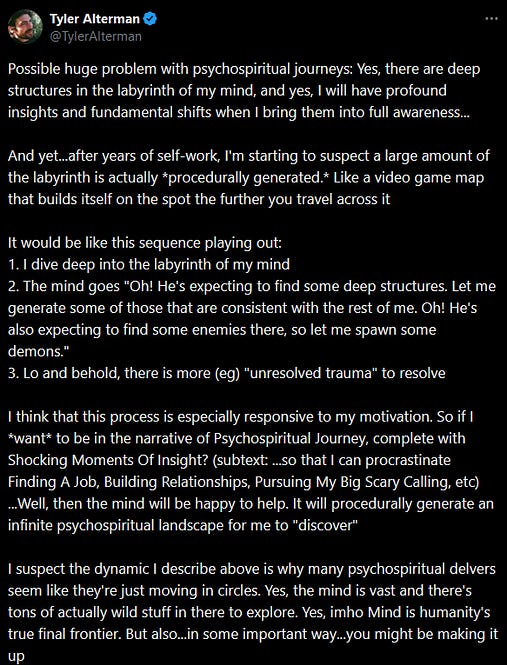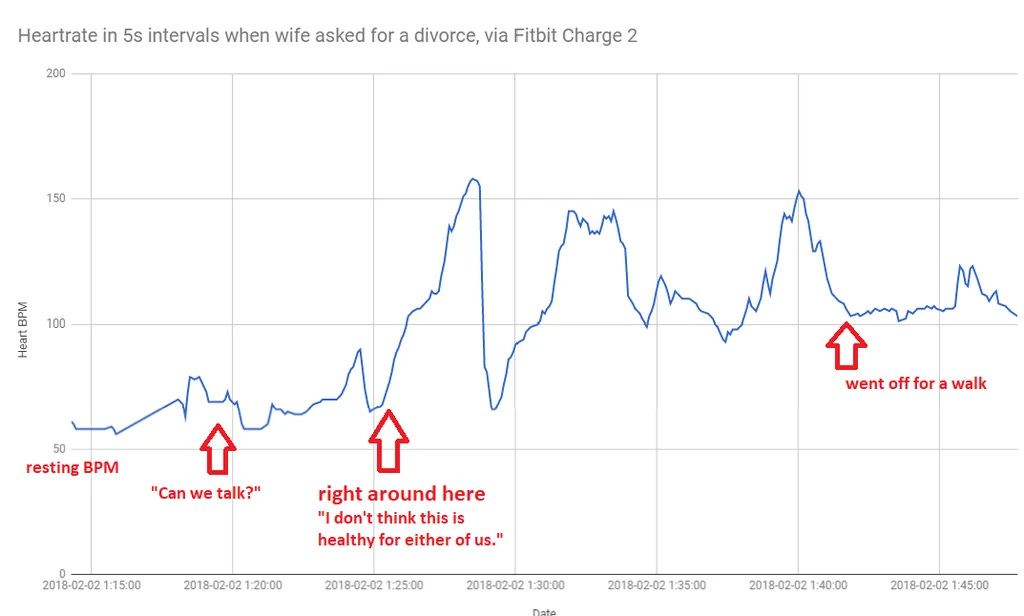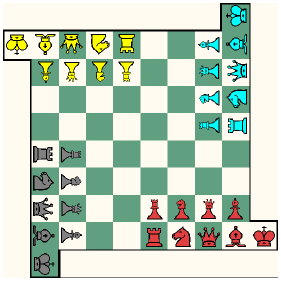Astral Codex Ten - Links For December 2024
[I haven’t independently verified each link. On average, commenters will end up spotting evidence that around two or three of the links in each links post are wrong or misleading. I correct these as I see them, and will highlight important corrections later, but I can’t guarantee I will have caught them all by the time you read this.] 1: Action movie star Steven Seagal has lived an interesting life since wrapping up his Hollywood career: He converted to Tibetan Buddhism, where a lama declared him to be the reincarnation of 16th century saint Chungdrag Dorje. He married (in turn) a Japanese woman, two American actresses, and "the top female dancer in Mongolia", and has seven children (along with being the guardian of the Panchen Lama's daughter). More recently, he has become a pro-Russian activist, made friends with Vladimir Putin, gotten honorary Russian citizenship, and was last seen in Kursk filming a propaganda movie to support Russian troops. 2: Russia fines Google $20,000,000,000,000,000,000,000,000,000,000,000 for blocking Russian YouTube channels. 3: The Long March Through The Institutions, Debunked. I’m not usually a fan of accusations that cultural Marxism is a “conspiracy theory” - some leading leftists said they should take over institutions, leftists did take over institutions, you don’t have to be a Nazi to wonder if these two things are connected. But Arturo Dzvyenka argues they aren’t - leftists had started doing this before Marcuse officially asked them to, and besides, the institution-taker-overs were mostly liberals and not the sort of Marxists who might listen to Marcuse. Dzvyenka says the real story is one of class: rising geographic mobility and industrial sophistication created a new class (defined as a group whose jobs give them a similar social position) of geographically mobile knowledge workers - the professional managerial class - whose class characteristics predisposed them to both liberalism and institutional control. 4: Rootclaim’s $1 million debate bet with Steve Kirsch over the costs vs. benefits of the COVID vaccine is officially happening. 5: Nick Maggiulli: "My favorite story about Sam Bankman-Fried involves his time at Jane Street Capital where he built a system to get the 2016 US Presidential election results [a few minutes] before any mainstream media outlets...however, despite learning of a pending Trump victory before anyone else, Jane Street still managed to lose money on their trade because they [incorrectly thought a Trump win would be bad for] US markets." 6: From r/evilbuildings: the Lookout Building in Polygone Riviera, France: 7: Study: women who are more prone to intrasexual competition are more likely to advise other women to cut their hair short, especially if those women are of similar attractiveness to themselves. This study is too cute to be true and I expect it not to replicate; I link it for amusement value only - but, uh, still be careful about whose advice you take. 8: A Conservative rabbinical assembly has released Halakhic Responses To Artificial Intelligence And Autonomous Machines, ie guidelines for how Jewish law should treat AI. Mostly boring, but it does cite Rabbi Tzvi Ashkenazi’s 18th century ruling about whether you can include a golem in a minyan. 9: The guy who accidentally threw away a hard drive with $700 million in Bitcoin is suing the city to let him search the landfill. I actually think the city (Newport, Wales) comes out looking pretty bad here. The guy is obviously miserable thinking about his lost chance at wealth, he’s promised them 10% which could be a big windfall to this medium-sized community, and their only argument against is “regulations say we can’t let the public into the landfill”. Is this what Scott Aaronson calls a blankface? 10: Michael Moore, famous for being one of the few people who predicted Trump’s win in 2016, very confidently declared that Trump would not win again this year (Do The Math: Trump Is Toast). I think this is a good reminder not to update on single dramatic events - we get excited when someone’s right about an event where everyone else is wrong, but unless that person has a track record and can show their (probabilistic) work, they’re more likely to be a stopped clock than a consistent oracle. 12: Nils Wendel discusses new schizophrenia medication Cobenfy. 13: Alfredo Parra of Qualia Research Institute on cluster headaches. Cluster headaches are plausibly the most painful medical condition. If you ask a cluster patient to rate their pain, they’ll almost always say 10/10. Does that mean the headaches are twice as painful as a 5/10 condition? There are some philosophical reasons to expect pain to be logarithmic, so plausibly cluster headaches could be orders of magnitude more painful than the average condition. Once you internalize that possibility, it throws a wrench into normal QALY ratings and suggests that, even though cluster headaches are pretty rare, they might cause a substantial portion of the global burden of disease (or even a substantial portion of the suffering in the world). Some psychedelics, especially psilocybin and DMT, seem to treat cluster headaches very effectively, so the more you believe this reanalysis, the more interested you should be in figuring out how to turn these into an accessible therapy (see clusterbusters for more information on this aspect). 14: Tessa Barton tries to see how long she can go without learning the results of the US election (series of YouTube videos). The Manifold Market is a spoiler for the results but has some good discussion. 15: Lawrence Kesteloot has made an actually good and usable version of my AI Art Turing Test, in case you want to play it with your friends (it’s the same fifty pictures I used, so you’ll have to find a friend who doesn’t read ACX). 16: A politician who wants to revive the Inca Empire was recently polling second in the upcoming Peruvian election, although it looks like his party may have been banned recently. I worry there might be some distinctly non-Incan influences on his party’s iconography, maybe related to why they got banned: 17: Is it true that the taller candidate usually wins US presidential elections? Some psychologists look into this and find that the taller candidate won a bit more often, but not distinguishable from chance; they do find a tendency for the taller candidate to win the popular vote, and “15.4% of the variation in popular support was explained by the relative heights of the candidates". But height is not destiny - seven US presidents have been shorter than the average person. 18: Zvi: The Sports Gambling Experiment Has Failed. I try to err on the side of liberty when it’s at all plausible, but I think Zvi makes a convincing case that this has destroyed too many lives for too little gain (it doesn’t even encourage people to be better at understanding risk and probability; the betting sites ban anyone who doesn’t seem like a rube). I think the best path from here is to cut losses and try to figure out how to restrict online sports betting without collateral damage to potentially positive-sum things like investments, financial innovation, and prediction markets. 19: Good explanation of the FTC’s monopoly case against Meta by Nicholas Decker. 20: Why does exercise help lose weight? Part of the reason is that the exercise itself burns calories, but another part is that athletes have higher resting metabolic rate. Why? Apparently a big part of this is that they have bigger livers, maybe something to do with a high protein diet. 21: Justin Welby, the outgoing Archbishop of Canterbury, lived an interesting life. His mother was Churchill's personal secretary, married a businessman, had an affair with Churchill's other secretary, and Justin was the result (he didn't learn this until he was 60!). He went to Cambridge, had a mystical experience that converted him to Christianity, worked for an oil company in Nigeria for 11 years, then quit to get ordained as a priest. He says he can speak in tongues - "It's just a routine part of spiritual discipline - you choose to speak and you speak a language that you don't know, it just comes" - and has written a book called "Can Companies Sin?". He lost his archbishop position last month for the most stereotypical possible reason - failed to investigate sex abuse by a church leader who was a friend of his. 22: Popular Russian jokes about the Ukraine War. 23: Matt Yglesias on how we might design family-friendly high-rise buildings. His main ideas: large floor plans, private internal courtyard (if it’s public, people wouldn’t feel safe letting their kids play there), retail on the ground floor (to preserve the streetscape and give families a convenient way to shop). The only thing I would add is that there needs to be amazing noise insulation (and some way to verify this!) - one reason I wouldn’t want to live in a high-rise with other families is the fear that if their six month old cries all night, now it’s my problem - and if it wakes up my six month old and makes her cry all night, then it’s doubly my problem. 24: Why Recursion Pharmaceuticals Abandoned Cell Painting For Brightfield Imaging. Recursion is what passes for a resounding success in biotech, ie a company that didn't die immediately. They were built on the promise of using ML on complicated highly-processed images of cells to learn enough about them to create new drugs. Their big insight the past few years is that ML has gotten so good - and is so skew to human biases about what's important or noticeable or relevant - that they might as well do the ML on simple microscope slides - it can figure out the rest. 25: Heterodox Academy has a new magazine, Inquisitive. It focuses on chronicling the fight for academic freedom, rather than publishing controversial things you would need academic freedom to say, which I think is a good choice (other outlets already cover the latter). Happy to see them speaking up against Big IRB. 26: Hazimism is an Islamic school popular among some ISIS jihadis that "[is] described as 'ultra-extreme' and 'even more extreme than ISIS'" ... "Hazimis believe that those who do not unconditionally takfir (excommunicate) unbelievers are themselves unbelievers, which opponents argue leads to an unending chain of takfir." 27: In 2021, I gave Yoram Bauman an ACX Grant to lobby for carbon taxation at the state level. He’s been doing that, but recently he also produced and performed in a romantic comedy about lobbying for carbon taxation at the state level. I guess this is the old saying about “write what you know”. 28: Sympathetic Opposition contra me on taste. If I understand correctly, her thesis is that taste doesn’t just make you hate bad art - it also gives you the ability to love good art more deeply, which can be a transformative experience. I’m not so sure - people seem to obsess over (to the point of centering their lives around) various forms of lowbrow art from Harry Potter to Marvel to anime. I think that distinguishing this from the deep love and transformation of highbrow art risks assuming the conclusion - the guy who says Harry Potter changed his life is deluded or irrelevant, but the guy who says Dostoyevsky did has correctly intuited a deep truth. But we believe this precisely because we know Dostoyevsky is tasteful and Rowling isn’t - I would prefer a defense of taste which is less tautological. 29: Frank Lantz contra me on taste. He says art should be viewed in the context of when it was created and what it was trying to say to that era in particular. I might respond to this at more length later, but my snap troll response is that this kind of contradicts the preceding, doesn’t it? If you read the Iliad, it either speaks to you and transforms your soul, or it doesn’t. Nobody says “I just finished the Iliad - give me a second to check whether it was novel for its time or not, so I can decide whether my soul should be transformed.” Or maybe they do - is this the point of Pierre Menard, Author Of The Quixote? 30: Related: we talked before about various edge cases of cancel culture. Here’s a real-life one: crypto company Coinbase has said they’ll end their relationship with any law firm that hires lawyers who have previously opposed crypto. Is this cancel culture? My position: doesn’t cross a bright line, since it punishes action rather than speech. But if you generalize it across all ideologies and professions, you get - what was that phrase again? - “an unending chain of takfir.” 31: The Southern Television Broadcast Interruption was an event in 1977 when a local news broadcast was interrupted by a voice claiming to represent “Ashtar Galactic Command”, telling humans that they must destroy their weapons and learn to live in peace with one another. Investigators suspect somebody deployed a very strong transmitter near the broadcast tower, so strong that it overwhelmed the original intended signal, but no suspect was ever identified. 32: Bentham’s Bulldog responds to all of your objections to donating to shrimp. 33: Seen on X: “Gas mileage in gallons per mile has area of area. What area does this correspond to?” (h/t @eigenrobot). One possible answer in the second half of this XKCD What If. 34: Penis-stealing witch update: a French diplomat in the Central African Republic is accused of “having organized a vast penis theft operation in the country”. More information here, which describes a QAnon-style conspiracy in which Western countries, concerned about falling birthrates, are stealing Africans’ penises in order to harvest hormones via nanotechnology. 35: Ozy on the psychology of long-firm fraudsters. “Just like altruistic jobs usually have lower salaries, jobs that pay in Getting To Hurt People pay less in money . . . Aristotle was right: being bad is bad for you.” 36: Tyler Alterman (tweet here, but it’s short enough that I’m going to copy-paste): I think something like this is pretty plausible - I see too many people who have too many insights but don’t seem to have the radical life transformation I would expect after a thousand deep insights into their soul. Alternative explanations are that they start from negative one million (eg trauma history) and the insights help them function at all (but many of these people seem functional before they start getting insights), or that they are internally and unobservably extremely happy even though this doesn’t improve their interpersonal effectiveness (I think some Buddhists are like this, but many forms of insight specifically claim to improve interpersonal effectiveness). Props to Tyler for putting it in such a pithy way. 37: Rethink Priorities’ public polling on EA. Good example of the maxim “You wouldn't worry so much about what others think of you if you realized how seldom they do.” Approximately 1% of people have heard of effective altruism, and their opinion is mostly “I think it has something to do with charity, so I guess it sounds nice”. Median opinion on FTX and SBF was “never heard of them” (only 20% of people had!) 38: Freddie de Boer says he was ghosted by the New York Times (he pitched them a time-sensitive article, their editor accepted his pitch and told him to write it a certain way, he stopped shopping the pitch around to other publications and wrote it the way NYT wanted, and then the editor never returned his emails or paid him). Seems like pretty unprofessional behavior, I’d like to think there’s an innocent explanation but at some point not noticing and publicly giving an apology itself becomes culpable. 39: Claim: “A student using the most basic AI prompt with no editing or revision at all, was 83% likely to outscore a student peer who actually did the work – all while having a generous 6% chance of being flagged if the teachers did not use any AI detection software.” 40: Someone did an AI Turing Test on poetry and found that people preferred AI-generated to real (popular article, paper). I guess this is specifically calculated to make me sweat, since unlike visual art I actually have great taste in poetry and am fiercely committed to it. I have a few contingent gripes - the real poems were often more Olde English (and therefore less readable) than the AI ones, etc - but I wouldn’t be surprised if the result persisted even after correcting for them. I guess in the end my deepest excuse is that I personally scored 100% in distinguishing human from AI on their six example poems, and I would be willing to listen to anybody who did equally well on the visual art version. 41: Congratulations to ACX reader Jerred Shepherd, who successfully donated a kidney last month! 42: There are increasingly many attempts to make crypto directly useful (ie without state-controlled onramps and offramps) for the average consumer. Subdoor.xyz lets you pay for various online subscriptions with crypto. Monezon.com tried to do this for Amazon, but I’ve heard conflicting reports about whether it’s still up or whether it ever worked. And KYCNOT.me takes a different path and tries to aggregate ways to get crypto without going through centralized exchanges. So far these aren’t very good, but I think there’s a dynamic where in order to be willing to accept the occasional payments (X% of your yearly income) you only need the occasional purchase (X% of your yearly expenses) to be payable in crypto - so small conveniences can make a big different. 43: Also related to crypto: Marc Andreesen went on Joe Rogan and made some explosive claims about the government debanking crypto founders for political reasons. These increasingly seem to be false. Patrick McKenzie has a good (albeit long and complicated) rundown here - the summary is that ordinary anti-money-laundering laws which predate cryptocurrency tell banks to be on the watch for certain dangerous transaction patterns, and crypto companies have those patterns. And after the nth time that a bank closed a crypto company account and the founder had the brilliant idea to game the system by running the company out of their personal account, the banks started closing crypto founders’ personal accounts too - something which they’re permitted to do by ordinary freedom-of-businesses-to-choose-clients laws. Jesse Singal goes into more detail on some other mistakes here - for example, Andreesen accused a regulator called the CFPB of being behind the debanking conspiracy, but CFPB has nothing to do with crypto, actually has been pretty principled in opposing debanking for conservatives, and Andreesen might have a grudge against them because of a time they shut down one of his companies for repeatedly deceiving its customers. I still think there’s a pro-crypto lesson here, albeit maybe not the one he intended. Banks are unaccountable amoral actors who have no qualms about cutting you out of the global financial system if an algorithm says people vaguely like you have posed a regulatory risk in the past, all banks are like this in a correlated way, and it would be nice to have some means of financial system access which isn’t like this. 44: Apropos of our recent conversation about policing, here’s a claim that arrests in London have dropped 10% after a new software product made police work extremely annoying and bureaucratic. 45: New Substack, Governing San Francisco, by a local pro-growth activist blogging about the new SF government and its plans and challenges. 46: Trump bends the knee to Harold Daggett and the longshoremen union: H/T Richard Hanania, who also points out that Trump’s Labor Secretary pick is pro-union and wants to “force red states to adopt the labor policies that have caused massive migration outflows from the more liberal parts of the country”. 47: Byrne Hobart has a book out, Boom, arguing that economic bubbles are a productive force, then expanding that into a broader theory of history and stagnation. Review here, book available here. 48: Garrison Lovely published the Confessions Of A McKinsey Whistleblower piece a few years ago and some of the better SB 1047 coverage more recently. He has a new Substack focusing on AI and his concerns about the big companies. 49: There’s been a Twitter spat over effective altruism. Back in 2019, Peter Singer published an article saying that rich donors gave $1 billion to rebuild Notre Dame after a fire, but that could have saved ~285,000 lives and maybe donors should take that equally seriously. This month, the NYT used “effective altruists are against restoring Notre Dame” as a jumping-off point for its real complaint (it would rather we have "a philanthropy network that gave specifically to social justice movements . . . racial justice groups, climate justice groups and transgender protection groups"). There were several good responses, most notably Dylan Matthews’. (my own opinion on Notre Dame: although you can come up with a model in which charitable dollars are zero-sum - each dollar I donate to the cathedral doesn’t go to Giving What We Can - this doesn’t really describe charity on the social level, where some donors are more excited about global health and others about national pride. To a first approximation, these things don’t funge, and attempting to capture the tiny bit of value from the ways they do funge isn’t worth making everyone in the world mad at us. Funding Notre Dame is in the top percentile of uses for money, and it feels mean-spirited to snipe at it and not at everything else in the world. People should consider donating a fixed fraction of their income that makes sense to them to effective charity, then feel free to use the rest for whatever they want, including other charity, without getting criticized.) I think the responses landed one clear hit - NYT accused EA of being “the dominant way to think about charity” and steamrolling other cause areas, but only about 0.18% of charitable giving is to EA causes and the NYT article should be considered a currently dominant paradigm trying to crush an underdog. But I also think that, overall, this is a story of us screwing up and taking the NYT’s bait. The world really wants to believe that effective altruists are evil humorless people who want to prevent every kind of good except raw life-saving and think you’re a moral monster for not agreeing. One thing I’ve learned in my time as a blogger is that if the world wants to think something that much, they will seize on anything at all in your writing that even faintly suggests it, and so you can’t afford to be even slightly edgy or ambiguous, and really you should insert “BY THE WAY, I'M NOT SAYING THE HORRIBLE THING YOU’RE DESPERATE TO ATTRIBUTE TO ME” every other sentence as a reminder. Not every response did this, so a lot of people seized on this as EA admitting that we hate cathedrals and human flourishing and probably you personally. This maybe isn’t entirely their fault? Utilitarianism doesn’t have a great theory of obligation, and it’s genuinely hard to assert “remember that your donation could save a life” without at least slightly implying “you are a moral monster for not donating more”. I would argue that effective altruists didn’t invent the fact that donations could save lives, it’s not our fault, and we’re at least working on the philosophical project of finding a balance between the Scylla of putting our fingers in our ears and denying that charity is possible, and the Charybdis of having everyone be infinitely condemned for not giving more to it. Relevant posts I’ve written are Nobody Is Perfect, Everything Is Commensurable and Axiology, Morality, Law. I also got in a series of Twitter discussions here where I claimed that probably all charity is supererogatory. Some of the discussions were a little successful in arguing me down from this, and I’m currently not sure whether it’s all supererogatory or whether it’s obligatory up to some small amount (possibly the amount that everyone would agree to in an ideal Platonic contract, or whatever the prevailing moral norm - eg 1% or 10% - but the fact that we can’t actually agree on this makes me suspicious that there’s not really a prevailing moral norm and pushes me more towards supererogatory). 50: Related: Sarah Constantin describes her new job at Renaissance Philanthropy, “the dream machine”. The idea is: rich people may want to donate money to causes that appeal to them. A rich person whose child died of a rare pediatric cancer might be more interested in donating to cure rare pediatric cancers than to bednets or whatever. Renaissance talks to them, figures out what cause (if it existed) would get them to donate, then acts as an intermediary to make it happen (eg tries to find scientists working on that type of cancer and discuss ways they could use the rich person’s money to make more progress). I think this is a great example of how to stop worrying and love the limited fungibility of charitable donations. 51: Quantified Self (source): 52: Nicholas Reville of Recursive Adaptation has published his Innovation Agenda For Addiction, sort of the Progress Studies-ish take on the opioid crisis and how to solve it. The main points are deploying GLP-1RAs for their anti-addictive effects, giving addiction medicines a special fast-track through the FDA, and various government incentives / advance purchase commitments / partnerships. Even aside from the plan, this is interesting to read for its examination of perverse incentives in medicine - for example, pharma companies are reluctant to develop anti-addiction medications because they don't want to be seen as "profiting off a crisis", and they don't want to study their existing medications for addiction because the studies might reveal new side effects that would harm their existing business. Everything here seems reasonable, but my main worry is that a lot of it is zero-sum - the FDA only has so much review capacity, spending it on addiction meds would decrease it for other meds, and I worry that every disease is so bad that "redirect the FDA to focus on this in particular!" sounds pretty good when you think about it on its own. I am more excited about finding ways to streamline it in general - but don't begrudge advocates for particular conditions for wishing they had an easier time. 53: Enochian chess was a four-player variant of chess invented by the Order of the Golden Dawn (think Aleister Crowley) to teach occult truths or something. "MacGregor Mathers, who finalised the game's rules, was known to play with an invisible partner he claimed was a spirit ... [he] would shade his eyes with his hands and gaze at the empty chair at the opposite corner of the board before moving his partner's piece." 54: There’s a conspiracy theory going around that rationalists and effective altruists secretly control Bluesky - I can’t believe this is our first “secretly controlled” accusation and it’s not even something cool. 55: The “fastest growing new religion in the world” is the cult of Santa Muerte (St. Death) in Mexico, with perhaps 29 million followers since going public in 2001. I find it hard to determine its appeal - the entire content of the religion seems to be “if you give sacrifices to an idol of a female skeleton, she will grant your prayers”. It’s not just that this is boring - it’s that it’s absolutely typical replacement-level paganism, and I’d always thought that Christianity beat paganism because it was inherently more attractive. Yet the Mexican youth are turning away from the stodgy boring Catholic Church en masse to worship Santa Muerte. Why? You're currently a free subscriber to Astral Codex Ten. For the full experience, upgrade your subscription. |
Older messages
Claude Fights Back
Thursday, December 19, 2024
... ͏ ͏ ͏ ͏ ͏ ͏ ͏ ͏ ͏ ͏ ͏ ͏ ͏ ͏ ͏ ͏ ͏ ͏ ͏ ͏ ͏ ͏ ͏ ͏ ͏ ͏ ͏ ͏ ͏ ͏ ͏ ͏ ͏ ͏ ͏ ͏ ͏ ͏ ͏ ͏ ͏ ͏ ͏ ͏ ͏ ͏ ͏ ͏ ͏ ͏ ͏ ͏ ͏ ͏ ͏ ͏ ͏ ͏ ͏ ͏ ͏ ͏ ͏ ͏ ͏ ͏ ͏ ͏ ͏ ͏ ͏ ͏ ͏ ͏ ͏ ͏ ͏ ͏ ͏ ͏ ͏ ͏ ͏ ͏ ͏ ͏ ͏ ͏ ͏ ͏ ͏ ͏ ͏ ͏ ͏ ͏ ͏ ͏ ͏
Highlights From The Comments On Prison
Tuesday, December 10, 2024
... ͏ ͏ ͏ ͏ ͏ ͏ ͏ ͏ ͏ ͏ ͏ ͏ ͏ ͏ ͏ ͏ ͏ ͏ ͏ ͏ ͏ ͏ ͏ ͏ ͏ ͏ ͏ ͏ ͏ ͏ ͏ ͏ ͏ ͏ ͏ ͏ ͏ ͏ ͏ ͏ ͏ ͏ ͏ ͏ ͏ ͏ ͏ ͏ ͏ ͏ ͏ ͏ ͏ ͏ ͏ ͏ ͏ ͏ ͏ ͏ ͏ ͏ ͏ ͏ ͏ ͏ ͏ ͏ ͏ ͏ ͏ ͏ ͏ ͏ ͏ ͏ ͏ ͏ ͏ ͏ ͏ ͏ ͏ ͏ ͏ ͏ ͏ ͏ ͏ ͏ ͏ ͏ ͏ ͏ ͏ ͏ ͏ ͏ ͏
Book Review: From Bauhaus To Our House
Tuesday, December 10, 2024
... ͏ ͏ ͏ ͏ ͏ ͏ ͏ ͏ ͏ ͏ ͏ ͏ ͏ ͏ ͏ ͏ ͏ ͏ ͏ ͏ ͏ ͏ ͏ ͏ ͏ ͏ ͏ ͏ ͏ ͏ ͏ ͏ ͏ ͏ ͏ ͏ ͏ ͏ ͏ ͏ ͏ ͏ ͏ ͏ ͏ ͏ ͏ ͏ ͏ ͏ ͏ ͏ ͏ ͏ ͏ ͏ ͏ ͏ ͏ ͏ ͏ ͏ ͏ ͏ ͏ ͏ ͏ ͏ ͏ ͏ ͏ ͏ ͏ ͏ ͏ ͏ ͏ ͏ ͏ ͏ ͏ ͏ ͏ ͏ ͏ ͏ ͏ ͏ ͏ ͏ ͏ ͏ ͏ ͏ ͏ ͏ ͏ ͏ ͏
Friendly And Hostile Analogies For Taste
Tuesday, December 10, 2024
... ͏ ͏ ͏ ͏ ͏ ͏ ͏ ͏ ͏ ͏ ͏ ͏ ͏ ͏ ͏ ͏ ͏ ͏ ͏ ͏ ͏ ͏ ͏ ͏ ͏ ͏ ͏ ͏ ͏ ͏ ͏ ͏ ͏ ͏ ͏ ͏ ͏ ͏ ͏ ͏ ͏ ͏ ͏ ͏ ͏ ͏ ͏ ͏ ͏ ͏ ͏ ͏ ͏ ͏ ͏ ͏ ͏ ͏ ͏ ͏ ͏ ͏ ͏ ͏ ͏ ͏ ͏ ͏ ͏ ͏ ͏ ͏ ͏ ͏ ͏ ͏ ͏ ͏ ͏ ͏ ͏ ͏ ͏ ͏ ͏ ͏ ͏ ͏ ͏ ͏ ͏ ͏ ͏ ͏ ͏ ͏ ͏ ͏ ͏
Indulge Your Internet Addiction By Reading About Internet Addiction
Tuesday, December 10, 2024
... ͏ ͏ ͏ ͏ ͏ ͏ ͏ ͏ ͏ ͏ ͏ ͏ ͏ ͏ ͏ ͏ ͏ ͏ ͏ ͏ ͏ ͏ ͏ ͏ ͏ ͏ ͏ ͏ ͏ ͏ ͏ ͏ ͏ ͏ ͏ ͏ ͏ ͏ ͏ ͏ ͏ ͏ ͏ ͏ ͏ ͏ ͏ ͏ ͏ ͏ ͏ ͏ ͏ ͏ ͏ ͏ ͏ ͏ ͏ ͏ ͏ ͏ ͏ ͏ ͏ ͏ ͏ ͏ ͏ ͏ ͏ ͏ ͏ ͏ ͏ ͏ ͏ ͏ ͏ ͏ ͏ ͏ ͏ ͏ ͏ ͏ ͏ ͏ ͏ ͏ ͏ ͏ ͏ ͏ ͏ ͏ ͏ ͏ ͏
You Might Also Like
AI, tech talent, and regional innovation, with retiring WTIA CEO Michael Schutzler
Saturday, December 21, 2024
Nick Hanauer calls wealth tax proposal 'impractical' ADVERTISEMENT GeekWire SPONSOR MESSAGE: Improve focus and memory with Thinkie: For a limited time, save $50 on Thinkie plus get your first
Gift of the Day: A Status Dog Leash
Saturday, December 21, 2024
“The cool leash that you see walking around in Soho.” The Strategist Gifts Every product is independently selected by editors. If you buy something through our links, New York may earn an affiliate
Guest Newsletter: Five Books
Saturday, December 21, 2024
Five Books features in-depth author interviews recommending five books on a theme. Guest Newsletter: Five Books By Sylvia Bishop • 21 Dec 2024 View in browser View in browser Five Books features in-
Read this. You will be glad you did.
Saturday, December 21, 2024
You can support the high-impact investigative reporting of The Intercept AND skip the flood of year-end fundraising emails. Let's all acknowledge the elephant in the room. This is a fundraising
What cephalopods know, and how we know it
Saturday, December 21, 2024
+ Bob Dylan's creative risks
It’s Gift-Buying Crunch Time
Saturday, December 21, 2024
Plus: What Chloe Bailey can't live without. The Strategist Every product is independently selected by editors. If you buy something through our links, New York may earn an affiliate commission.
Placating Paranoia
Saturday, December 21, 2024
December 21, 2024 The Weekend Reader Required Reading for Political Compulsives 1. What Is MAHA? How wellness culture with legitimate concerns (and some conspiratorial beliefs) became a movement poised
YOU LOVE TO SEE IT: Banning The Bans
Saturday, December 21, 2024
Censorship gets banned, youth score a climate win, nurses win a major union vote, workers' rights are clear and unmistakable, and small businesses go boom. Banning The Bans By Sam Pollak • 21 Dec
The 34 best last-minute gifts
Saturday, December 21, 2024
It's not too late View in browser Ad The Recommendation December 21, 2024 Ad Procrastinators, rejoice A selection of last-minute gifts Wirecutter recommends, including Glerups, water color paint, a
Weekend Briefing No. 567
Saturday, December 21, 2024
My Top 11 Books of 2024 ͏ ͏ ͏ ͏ ͏ ͏ ͏ ͏ ͏ ͏ ͏ ͏ ͏ ͏ ͏ ͏ ͏ ͏ ͏ ͏ ͏ ͏ ͏ ͏ ͏ ͏ ͏ ͏ ͏ ͏ ͏ ͏ ͏ ͏ ͏ ͏ ͏ ͏ ͏ ͏ ͏ ͏ ͏ ͏ ͏ ͏ ͏ ͏ ͏ ͏ ͏ ͏ ͏ ͏ ͏ ͏ ͏ ͏ ͏ ͏ ͏ ͏ ͏ ͏ ͏ ͏ ͏ ͏ ͏ ͏ ͏ ͏ ͏ ͏ ͏ ͏ ͏ ͏ ͏ ͏ ͏ ͏ ͏ ͏ ͏ ͏ ͏ ͏ ͏





